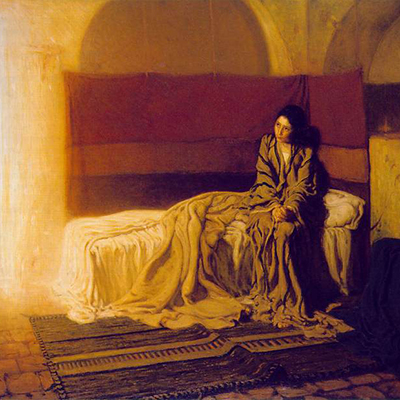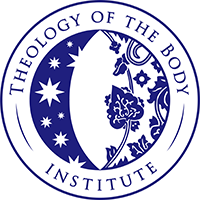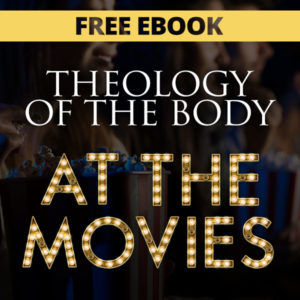

The Holy Spirit and Mary: Model of the Nuptial Union of God with Humanity
The Holy Spirit and Mary: Model of the Nuptial Union of God with Humanity

As we celebrate the Feast of the Annunciation on March 25, I invite you to read this meditation from St. John Paul II on the glorious “nuptials” revealed through the feast. This is a private translation of an address not publicly available in English. May it lead you into the heart of the glory of the marriage of heaven and earth consummated in Mary’s womb…
The Holy Spirit and Mary:
Model of the Nuptial Union of God with Humanity
(General Audience of St. John Paul II from May 2, 1990)
1. The revelation of the Holy Spirit in the Annunciation is united to the mystery of the Incarnation of the Son of God and the divine maternity of Mary. We are able to see, in the Gospel of St. Luke, the angel says to the Virgin: “The Holy Spirit will come upon you” (Lk 1:35). It is also the action of the Holy Spirit which provokes her response, in which is manifested a conscious act of human freedom: “Let it be done to me according to your word” (Lk 1:38). Therefore, in the Annunciation we find the perfect “model” of what the personal God-man relationship is meant to be.
2. Even in the Old Testament this relationship expresses a unique quality. It is born in the terrain of the Covenant of God with the chosen people (Israel). And this Covenant in the prophetic texts is expressed with nuptial symbolism: it is presented as the nuptial bond between God and humanity. It is important to remember this in order to understand the depth and beauty of the reality of the Incarnation of the Son as a particular fullness (plentitude) of the action of the Holy Spirit.
3. According to the prophet Jeramiah, God says to his people: “With eternal love I have loved you; so I have kept my mercy toward you. I will return to you and rebuild you, virgin of Israel” (Jer 31:3-4). From the historical point of view, we should place this text in relation to the fall of Israel and the deportation to Assyria, which humiliates the chosen people, to the extent of believing themselves abandoned by God. But God encourages them, speaking as Father or Husband to the young beloved. The spousal analogy becomes even more clear and explicit in the words of Isaiah, directed, during the time of the Babylonian exile, toward Jerusalem as to a wife who had not remained faithful to the God of the Covenant: “For your Maker is your husband, the Lord of hosts is his name… The Lord calls you back, like a wife forsaken and grieved in spirit, a wife married in youth and then cast off, says your God. For a brief moment I abandoned you, but with deep compassion I will bring you back. In a surge of anger I hid my face from you for a moment, but with everlasting kindness, I will have compassion on you, says the Lord your Redeemer” (Is 54:5-8).
4. It is emphasized in the cited texts that the nuptial love of the God of the Covenant is “eternal.” Facing the sin of his wife, facing the infidelity of the chosen people, God allows painful experiences to come upon them, but in spite of that he assures them, through the prophets, that his love does not cease. He overcomes the evil of sin to renew his gift. The prophet Hosea declares with an even more explicit language: “I will espouse you to me forever; I will espouse you in justice and in righteousness, in love and in compassion; I will espouse you to me in fidelity, and you will know the Lord” (Hos 2:21-22).
5. These extraordinary prophetic texts from the Old Testament reach their true fulfillment in the mystery of the Incarnation. The nuptial love of God toward Israel, but also toward every man, is brought about in the Incarnation in a way that exceeds the measure of man’s expectations. We discover this in the pages of the Annunciation, where the New Covenant is presented to us as the Nuptial Covenant of God with man, of divinity with humanity. In the context of this nuptial covenant, the Virgin of Nazareth, Mary, is the “virgin-Israel” par excellence of Jeremiah’s prophecy. God’s nuptial love, announced by the prophets, is concentrated on her perfectly and definitively. She is also the virgin-bride to whom it is granted conceiving and bearing forth the Son of God: the unique fruit of the nuptial love of God toward humanity, represented and summarized comprehensively as it were in Mary.
6. Descending upon Mary in the Annunciation, the Holy Spirit is the One who, in the Trinitarian relationship, expresses in his Person God’s nuptial love, that love that is “eternal.” In that moment the Holy Spirit is, in a unique way, the God-Spouse. In the mystery of the Incarnation the Holy Spirit effects the human conception of the Son of God while maintaining the divine transcendence. Luke’s text expresses this in a precise way: the nuptial nature of the love of God has a completely spiritual and supernatural nature. What John will come to say about Christ’s believers applies all the more to the Son of God, who was conceived in the womb of the Virgin “not by the desire of the flesh, nor by the desire of man, but rather born of God” (Jn 1:13). But above all, this expresses the supreme union of love, brought about between God and a human being by the work of the Holy Spirit.
7. In this divine espousing of humanity, Mary responds to the announcement of the angel with the love of a bride, capable of responding and adapting perfectly to the divine election. As a result of all of this, from the time of St. Francis of Assisi, the Church calls the Virgin the “spouse of the Holy Spirit.” Only this perfect nuptial love, profoundly rooted in the complete virginal self-giving to God, could enable Mary to become the “Mother of God” in a conscious and worthy way, in the mystery of the Incarnation.
8. In the Encyclical Redemptoris Mater I wrote: “The Holy Spirit had already come down upon her, and she became his faithful spouse at the Annunciation, welcoming the Word of the true God, offering ‘the full submission of intellect and will … and freely assenting to the truth revealed by him,’ indeed abandoning herself totally to God through ‘the obedience of faith,’ whereby she replied to the angel: ‘Behold, I am the handmaid of the Lord; let it be to me according to your word’” (26).
9. Mary, with this act and gesture, totally reverses the act of Eve, and becomes, in the spiritual history of humanity, the new Bride, the new Eve, Mother of all the living, as the Doctors and Fathers of the Church have stated frequently. She will be the type and model, in the New Covenant, of the nuptial union of the Holy Spirit with each of us and with all of the human community, far beyond the context understood in ancient Israel: all individuals and all peoples will be called to receive the gift and to benefit from it in a new community of believers who have received the “power to become children of God” (Jn 1:12) and in baptism have been reborn “of the Spirit” (Jn 3:3) forming the family of God.


